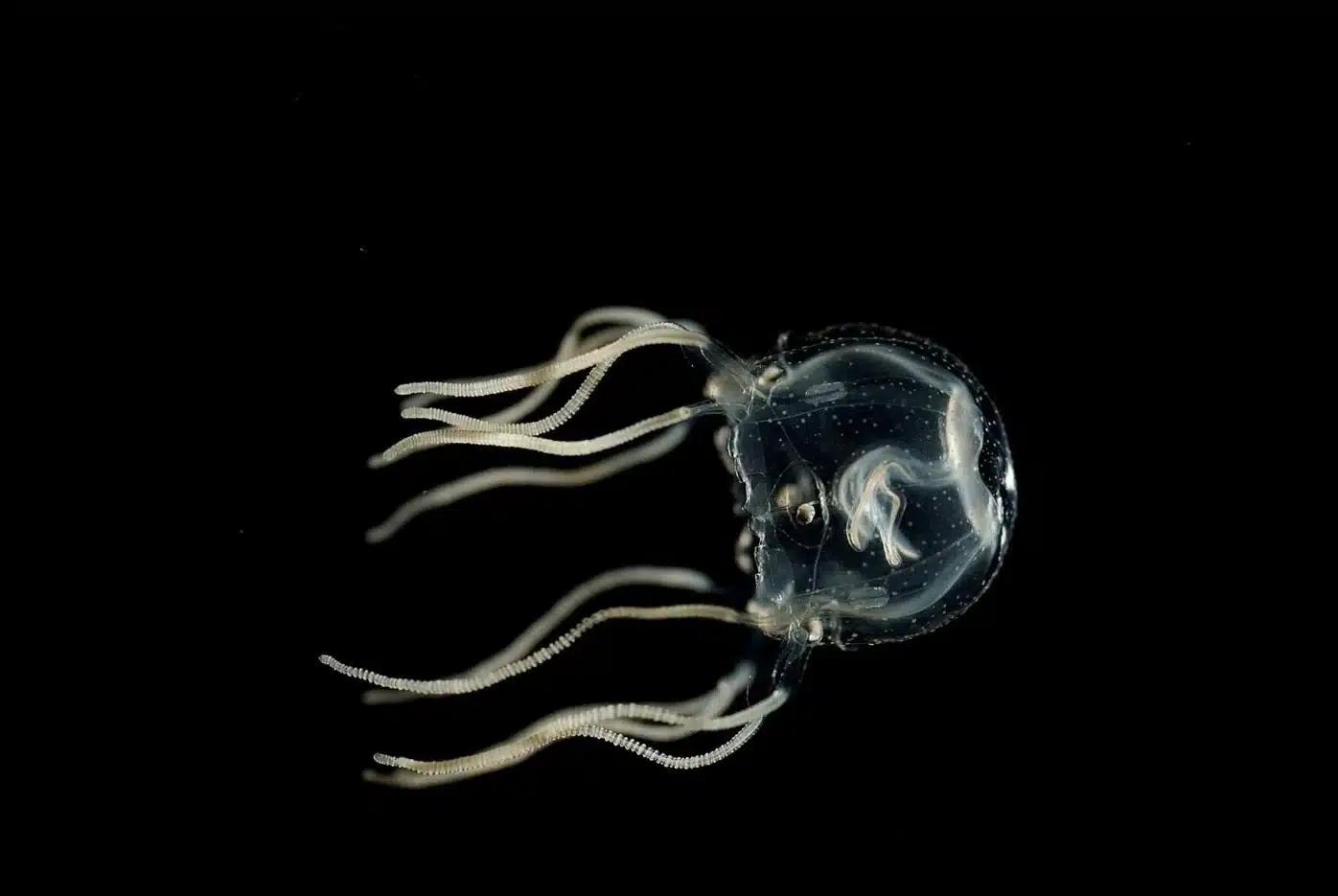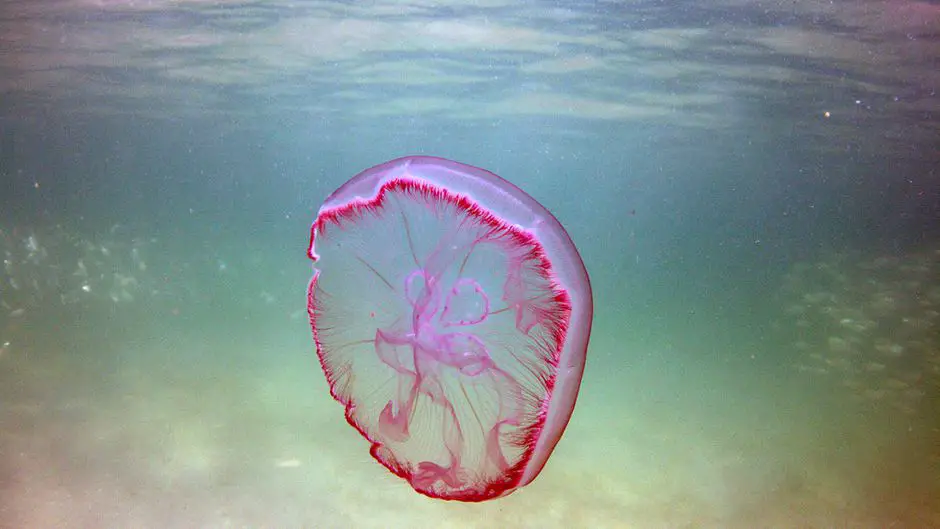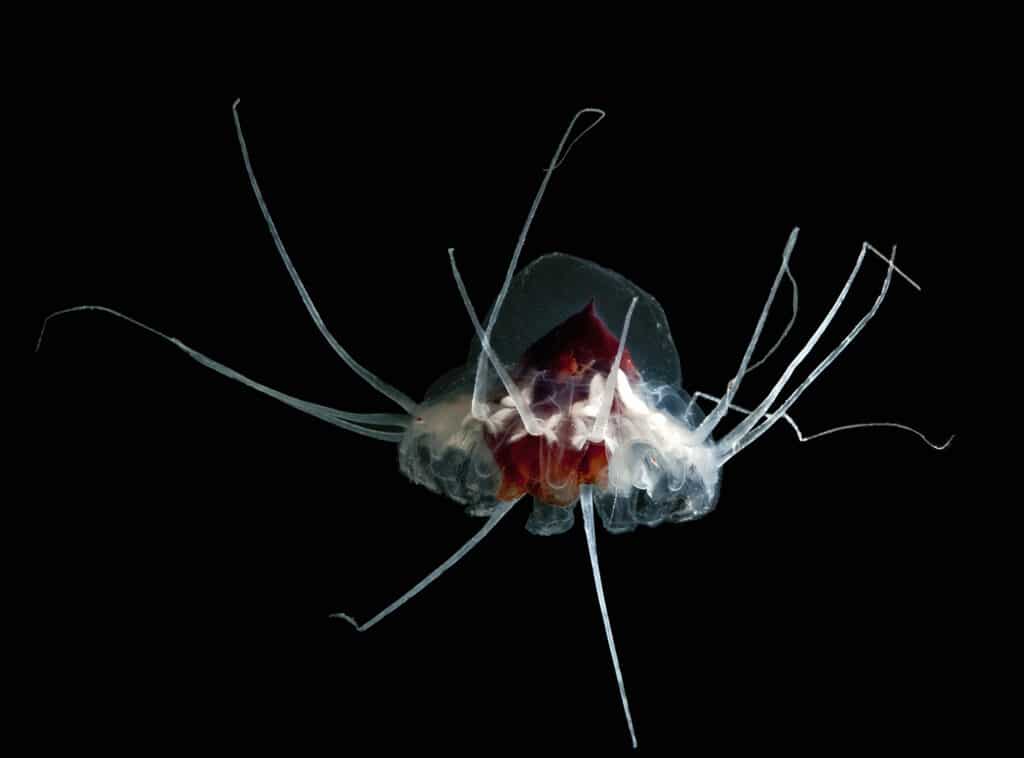Are Jellyfish Intelligent

Introduction
Are Jellyfish Intelligent: The enigmatic world of jellyfish has long fascinated scientists and enthusiasts alike. These ethereal, gelatinous creatures, with their mesmerizing, pulsating movements, seem to dance through the ocean’s depths, defying gravity and convention.
At first glance, it might seem absurd to attribute intelligence to these seemingly simple organisms. After all, they lack a centralized brain, a complex nervous system, and exhibit behaviors that appear to be largely driven by instinct. However, the concept of intelligence is not limited to the human understanding of the term. In the natural world, intelligence can take various forms, and it is often shaped by an organism’s unique ecological niche and evolutionary history.
This exploration delves into the fascinating realm of jellyfish intelligence, aiming to unravel the mysteries surrounding their cognitive abilities. While they may not possess intelligence in the traditional sense, these creatures have evolved remarkable strategies for survival, navigation, and adaptation. By examining their behaviors, sensory perception, and interactions with their environment.
Join us on this journey to unveil the secrets of jellyfish intelligence, where science meets the poetry of the ocean’s depths, challenging our preconceptions about what it means to be intelligent in the natural world.

Does jellyfish have intelligence?
Caribbean box jellyfish are barely a centimetre long and have no brain. But these gelatinous, fingernail-sized creatures are capable of learning from visual cues to avoid swimming into obstacles — a cognitive ability never before seen in animals with such a primitive nervous system, researchers said on Friday.
Unlike animals with well-developed brains, jellyfish have a decentralized nervous system, consisting of a network of nerve cells (neurons) spread throughout their gelatinous bodies. This basic nervous system allows them to perceive and respond to their environment, exhibiting behaviors such as swimming, prey capture, and avoidance of predators.
While these behaviors may appear rudimentary compared to the complex cognitive abilities of some other species, they reflect a form of intelligence tailored to the specific challenges jellyfish face in their aquatic habitats. They can navigate ocean currents, find food, and avoid danger through a combination of instinctual responses and sensory perception.
Some researchers argue that intelligence should be defined more broadly to encompass various adaptations that enable an organism to survive and reproduce in its ecological niche. In this context, jellyfish exhibit a unique type of intelligence that serves their needs effectively.
While jellyfish may not possess intelligence in the conventional sense, they display a remarkable array of behaviors and sensory capabilities that highlight their ability to thrive in the dynamic world of the ocean. The exploration of jellyfish intelligence continues to expand our understanding of cognition in the animal kingdom.
Are jellyfish brainless?
Jellyfish, despite lacking centralized brains, exhibit advanced learning abilities similar to humans and other complex organisms, challenging traditional beliefs about neural learning processes.
Jellyfish are often characterized as “brainless” creatures, primarily due to their lack of a centralized brain, which is a hallmark feature of many animals with advanced cognitive abilities. Instead, jellyfish have a decentralized nervous system known as a “nerve net.” This nerve net consists of interconnected neurons distributed throughout their gelatinous bodies.
While jellyfish may not possess a brain in the traditional sense, it would be an oversimplification to label them as entirely brainless. They rely on this decentralized network of neurons to perform essential functions such as sensing changes in their environment, responding to stimuli, and coordinating their basic movements, like swimming and hunting.
These simple neural circuits enable jellyfish to exhibit behaviors that are crucial for their survival, like capturing prey, avoiding predators, and navigating ocean currents. Their ability to process sensory information and react to it demonstrates a level of rudimentary intelligence that aligns with their ecological niche.
While jellyfish do not possess a centralized brain, their nerve net allows them to perform vital functions and adapt to their environment. This showcases a form of neural intelligence tailored to their specific needs as they drift through the ocean’s currents, challenging the notion that intelligence is solely defined by the presence of a centralized brain.
Are jellyfish friendly to humans?
Jellyfish stings can be painful to humans and sometimes very dangerous. But jellyfish don’t purposely attack humans. Most stings occur when people accidentally touch a jellyfish, but if the sting is from a dangerous species, it can be deadly. Jellyfish digest their food very quickly.
Jellyfish and their interactions with humans can be a mixed bag, and whether they are friendly or not largely depends on the specific species and circumstances. In general, jellyfish are not inherently aggressive or hostile toward humans. They lack the means to actively pursue or attack people.
However, some jellyfish species possess stinging cells (nematocysts) that they use primarily for capturing prey. When humans come into contact with these stinging cells, often by accidentally brushing against tentacles in the water, it can lead to painful stings and skin irritation. In some cases, particularly with certain species like the box jellyfish and Portuguese man-of-war, these stings can be more severe and potentially dangerous, requiring immediate medical attention.
It’s important to note that the majority of jellyfish species encountered by beachgoers and swimmers are not harmful, and their stings are typically mild and treatable. Taking precautions such as wearing protective clothing, paying attention to local warnings, and seeking medical assistance if stung can mitigate the risks associated with jellyfish encounters.
While jellyfish are not intentionally unfriendly to humans, their stinging defense mechanisms can lead to discomfort or injury if appropriate precautions are not taken when swimming or snorkeling in areas where they are present. Respect for these creatures and their habitats is essential for peaceful coexistence.
Are some jellyfish friendly?
Jellyfish are found in every ocean around the world and prefer to live in coastal areas. Some jellyfish are harmless to humans but others have venom that can be very deadly. The box jellyfish is one of the most venomous animals on the planet!
When considering whether some jellyfish can be considered “friendly,” it’s important to clarify that jellyfish do not exhibit friendliness in the same way humans do. They lack the capacity for social behavior or emotions. However, some jellyfish species are less harmful to humans and marine ecosystems than others.
Many jellyfish species are benign and pose no significant threat to humans. They exist peacefully in their aquatic environments, contributing to the marine ecosystem as part of the food chain. These “friendly” jellyfish typically have mild or non-existent stinging cells and are not prone to aggressive behaviors.
In contrast, certain species, like the box jellyfish and Portuguese man-of-war, have potent stinging cells and can deliver painful stings that are harmful to humans. These jellyfish are less “friendly” in the context of human interactions, as their stings can lead to discomfort and, in rare cases, serious health issues.
While it’s not accurate to describe jellyfish as friendly or unfriendly, understanding the characteristics and behaviors of different species is crucial for safe coexistence in marine environments. Respect for the diversity of marine life, including jellyfish, is essential for fostering harmony and balance in ocean ecosystems.
Do jellyfish have memories?
It turns out that, even though they have no brains, they can learn and form memories. Researchers have seen for the first time that jellyfish can learn in a complex manner, and adapt their behavior based on that learning.
Jellyfish possess a very basic and limited form of memory, but it differs significantly from the memory systems found in more complex animals, such as humans. Their memory is primarily tied to simple associative learning and very short-term information retention.
Jellyfish can learn to associate certain environmental cues with specific outcomes. For instance, they may learn to associate the presence of prey with food, leading them to repeat behaviors that result in successful captures. This type of learning is often driven by the jellyfish’s basic nervous system and reflex-like responses.
However, their memory capabilities are extremely short-lived. They can remember and respond to information for only a very brief period. Unlike animals with more developed brains, jellyfish do not have the capacity for long-term memory or complex cognitive processes. Their memory is more akin to a series of rapid, instinctual responses rather than conscious, deliberative thought.
In essence, while jellyfish do exhibit a form of memory related to basic survival and feeding behaviors, it is vastly different from the intricate memory systems observed in animals with more advanced nervous systems. Jellyfish rely on simple, immediate associations to navigate their environment and secure their sustenance.
Are jellyfish blind?
Jellyfish eyes range from primitive to more complex. Some simply have what Janssen described as “eye spots,” which detect light, but little else. Others, including box jellies (Tripedalia cystophora), have a more complex visual system complete with lenses, retinas and corneas. These jellies can see blurry images.
Jellyfish are not blind in the traditional sense because they have a basic visual system, although it is quite different from that of humans and many other animals. Jellyfish do not possess complex eyes like mammals or birds, but they have a type of light-sensing structure known as a “rhopalium.”
Each rhopalium contains clusters of specialized cells called “photoreceptors” that can detect changes in light intensity. While these photoreceptors are not capable of forming detailed images or providing a sophisticated visual experience, they do allow jellyfish to perceive variations in light levels.
Jellyfish use their rudimentary visual system primarily to detect changes in ambient light conditions. This helps them respond to their environment, such as swimming up toward the surface to catch more sunlight for their symbiotic algae or descending to darker depths to avoid predators.
While jellyfish do possess a form of light-sensing capability through their rhopalia, it is far less complex than the vision of many other animals. Their visual perception is oriented toward basic light detection and responses to environmental changes rather than forming detailed images or recognizing specific objects.
Do some jellyfish species display more advanced behaviors than others?
Within the mesmerizing realm of jellyfish, a curious spectrum of behaviors unfolds across different species. While these enigmatic creatures are often associated with passive drifters, some species defy this stereotype with surprising displays of sophistication. For instance, the box jellyfish, with its complex nervous system, exhibits a striking level of coordination in hunting prey and evading threats. It possesses a set of eyes, a rarity among jellyfish, enabling it to discern light and make rudimentary navigational decisions.
Additionally, the lion’s mane jellyfish, known for its majestic tentacles, showcases a unique strategy for survival. It actively contracts and relaxes its bell to control its vertical movement in the water column, a feat not commonly seen in other species. Some deep-sea varieties demonstrate remarkable bioluminescence, illuminating their path in the abyssal darkness, suggesting a highly specialized adaptation to their environment.
While the majority of jellyfish lead relatively simple lives, propelled by ocean currents, these exceptional behaviors among select species underscore the intricate diversity within this ancient lineage. The study of these nuanced behaviors not only unveils the fascinating intricacies of marine life but also prompts a deeper appreciation for the intricate tapestry of existence that thrives beneath the waves.
Do jellyfish exhibit any behaviors that might suggest intelligence?
Jellyfish, though seemingly ethereal and passive, possess a surprising array of behaviors that hint at a level of intelligence beyond their simple nervous systems. Some species display remarkable problem-solving abilities. For example, the Cassiopea jellyfish has been observed to actively seek out optimal spots for settling on the sea floor, indicating a capacity for spatial awareness and decision-making.
Certain jellyfish exhibit an impressive level of coordination in their hunting techniques. Box jellyfish, equipped with a sophisticated nervous system, demonstrate purposeful movements when pursuing prey and avoiding obstacles. They possess rudimentary eyes, allowing them to discern light sources and navigate their surroundings, a trait indicative of evolved sensory perception.
Moreover, some jellyfish showcase an intriguing capacity for memory and learning. Experiments with the moon jellyfish suggest that they can remember patterns associated with food sources, displaying a form of associative learning. This ability implies a degree of cognitive processing and memory retention, challenging the notion of jellyfish as purely instinctual beings.
While the concept of intelligence in jellyfish remains a subject of scientific exploration, these behaviors offer tantalizing glimpses into the potential depths of their cognitive abilities. Studying these enigmatic creatures not only enriches our understanding of marine life but also prompts us to reevaluate the diverse manifestations of intelligence across the animal kingdom.

Conclusion
The question of whether jellyfish are intelligent remains a complex and intriguing puzzle in the realm of marine biology and animal cognition. Throughout this exploration, we’ve uncovered various aspects of their behavior and physiology that challenge conventional definitions of intelligence.
While jellyfish lack the sophisticated neural structures found in many other animals, they have adapted in remarkable ways to thrive in their watery habitats. Their ability to perceive environmental cues, exhibit complex swimming patterns, and adapt to changing conditions showcases a unique form of intelligence rooted in instinct and evolutionary processes.
Their interactions with their surroundings, such as their capacity to sense and respond to prey, predators, and environmental factors, demonstrate a level of sophistication that hints at a deeper intelligence beyond our current understanding.
In essence, the concept of intelligence in the natural world is multifaceted and not solely defined by the presence of a centralized brain. The mysteries of jellyfish intelligence serve as a reminder that the animal kingdom offers a diverse tapestry of cognitive adaptations, each finely tuned to the challenges of its ecological niche.
As we continue to study and appreciate these graceful and enigmatic creatures, our understanding of intelligence in the context of the ocean’s depths deepens. The jellyfish live, with its pulsating beauty and intriguing behaviors, invites us to embrace a broader perspective on what it means to be intelligent in the wondrous tapestry of life on Earth.



